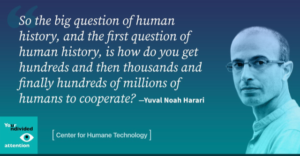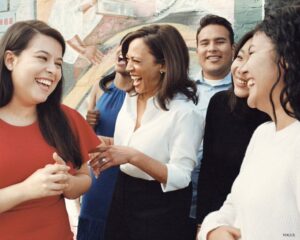Unity?
January 19, 2021Documentary film maker Ken Burns:
“I used to think there were three great crises: the Civil War, the Depression and the Second World War in American life. I would add this. And maybe this is the very, very worst. But at the same time, we just keep going forward. There is no other option but to endure.” [NPR]
‘Well, darkness has a hunger that’s insatiable, and lightness has a call that’s hard to hear.’
-Indigo Girls
American politics has reached a moment of existential uncertainty. Beyond the headlines and news alerts are problems bigger than any one administration—problems that stem from the deep tensions and challenges in America’s political institutions.
It’s time to reevaluate and revisit how we think about American democracy. The Founding Fathers did their best, but the hosts of a new podcast, “Politics in Question,” have some ideas, too. They discuss political reforms in this first-of-its-kind show that asks the very biggest questions.
Join hosts Lee Drutman, Julia Azari, and James Wallner, three lively experts on American political institutions and reform, as they imagine and argue over what American politics could look like if citizens questioned everything.
There are a lot of podcasts about the daily chaos. But “Politics in Question” is the first to step back and think big about the basic structures and processes of democracy — and to take nothing for granted.
This podcast is part of The Democracy Group, a network of podcasts that examines what’s broken in our democracy and how we can work together to fix it.
“From all the thoughts of ‘I’ and ‘man,’ that man finds utter peace.”
Bhagavad Gita
Dear Dayle,
The extremist behavior and violence that took place in Washington, D.C. on January 6 was truly shocking and worthy of condemnation—many have already done so. The whole world is transfixed, bearing witness to the awful and extraordinary unfolding of history.
In my previous letters I wrote about the DISORDER that is already upon us, as well as the consequences that ensue when illusions of power and privilege co-opt and distort Christianity. At the Center for Action and Contemplation, we are free to speak in great part because we are not beholden to the usual constituencies. Using the brilliant metaphor from the Hebrew Scriptures, we are “outside the camp” of either political party, any need to influence an election, and, by the grace of God, any negative or fear-based church pressure from Rome, Santa Fe, or Assisi.
We are also, like few other organizations, free from the coercion of donors and finance, thanks to almost thirty-three years of operating with our priorities clearly in view to all who cared to study or read our publications. Blessedly, our donors have not run for cover over time, but only increased in numbers, continuing to join us—even from outside the usual camps of both religion and politics.
Few people enjoy such freedom of living and teaching from the edge of the inside. This is the unique position that a prophetic charism holds and for which it is responsible; it is structurally quite rare, and therefore we must use it.
“Moses used to take the tent, and pitch it outside the camp, at some distance from the camp. . . . Anyone who wanted to consult Yahweh would go to this tent of meeting outside the camp.” (Exodus 33:7)
The “tent of meeting” is the initial image and metaphor that eventually became our much later notion of “church.” Moses had the prescience and courage to move the place of hearing God outside and at a distance from the court of common religious and civic opinion—this was the original genius that inspired the entire Jewish prophetic tradition. It is quite different than the mere liberal and conservative positions, and often even at odds with them. Most of liberalism is based on a secular foundation of knowledge, and most of conservatism is identified with boundary-keeping, order, and control. By contrast, Prophecy and Gospel are rooted in a contemplative and non-dual way of knowing—a way of being in the world that is utterly free and grounded in the compassion of God.
The early desert fathers and mothers imitated both Moses and Jesus by fleeing to Egypt, Syria, Palestine, and Cappadocia—and some as far as Ireland and Scotland. Beginning in the 4th century, we Christians surrendered our unique and free perspective to the Roman and Byzantine Empires. In the desert and outside the camp, these people discovered what we now call “contemplation”: the alternative mind and the alternative community to the status quo—then and now—of money, power, and war.
The free and graced position found in the tent of meeting is what allowed Jesus and all prophets in his lineage to speak from a minority position. It is always less desirable, compared to the comfortable and enjoyable places at the center and the top; yet it is the Jesus stance, and the place where all Franciscans follow after him.
“Let us go to him, therefore, outside the camp, and be willing to share in his degradation.” (Hebrews 13:13)
For many people, religion as a “cosmic egg” capable of holding universal Truth, collective and personal meaning, is broken. Now, the cracks in this very “uncosmic egg” are rapidly spreading in all directions. Delusions enthrall us and inherent deceit becomes overwhelmingly apparent and manifest in the nihilism of our postmodern age, the denial of science and reasonableness, and the denial of the pandemic that now assaults us all. The very future of the meanings of words and truth are at stake, as specifically exemplified by Trumpism in its many forms.
We must again move with Jesus outside the camp and even be willing to “share in his degradation” if that be God’s will. We must trust that the one who has called us into this present moment will also sustain us and lead us through it.
“Yahweh would speak with Moses face to face [outside the camp] as a young man speaks with his friend. And then Moses would return to the camp.” (Exodus 33:11)
This is the primary vocation of the Center for Action and Contemplation. We invite you to join us—first, in the tent of meeting outside the camp for prayer, dialogue, and deep discernment. Then, like Moses, we must all choose to “return to the camp,” where all of our brothers and sisters live and die.

Maybe unity is not possible, yet, we can remember that we are one, one in humanity as species and co-creators in our reality with ourselves and in each other…especially in context and proximity of losing our democracy, our republic, just three weeks ago. Can we pledge, at least, to cooperation? To listening? To empathy?
We are ‘we the people.’ Let us remember. And may we vow today to divest ourselves from the for-profit platforms and groups that feed disinformation and hate into our collective bloodstream. It must end.
And in less than 24 hours, the first woman vice president in the United States.
-dayle
🤍




